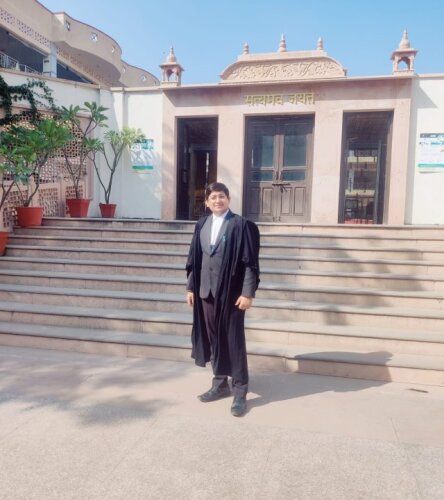Best Bankruptcy & Debt Lawyers in Jaipur
Share your needs with us, get contacted by law firms.
Free. Takes 2 min.
List of the best lawyers in Jaipur, India
India Bankruptcy & Debt Legal Questions answered by Lawyers
Browse our 2 legal questions about Bankruptcy & Debt in India and read the lawyer answers, or ask your own questions for free.
- Loans
- Currently I am multiple unsecured loans. Due to mental health issues I lost my job and all assets. So should I go for Individual bankruptcy?
-
Lawyer answer by Quartz Legal Associates
Based on the facts shared, it is explained that at present, individual bankruptcy in India is not governed by the Insolvency and Bankruptcy Code (IBC) because the provisions relating to ordinary individuals have not yet been implemented by the Government....
Read full answer - Sir, I have to take my payment from my customer party & he is not paying
- Sir, I'm doing textile business & have supplied fabric to my party amt is 4,12,536/00. My customer is not giving payment still he is capable.
-
Lawyer answer by Quartz Legal Associates
Based on the facts stated, it is my considered opinion that you have supplied fabric worth ₹4,12,536 to your customer in the ordinary course of your textile business, the goods have been duly delivered and accepted, and despite being financially...
Read full answer
About Bankruptcy & Debt Law in Jaipur, India
Bankruptcy and debt law in Jaipur, India, falls under the broader purview of insolvency law, which is governed by the Insolvency and Bankruptcy Code (IBC) of 2016. This legal framework aims to consolidate and amend laws relating to reorganization and insolvency resolution of corporate persons, partnership firms, and individuals in a time-bound manner to maximize the value of their assets, promote entrepreneurship, and balance the interests of all stakeholders. Jaipur, as a prominent city in India, adheres to these national guidelines while also dealing with any local nuances in implementation.
Why You May Need a Lawyer
There are several common situations where individuals and businesses in Jaipur may require legal help with bankruptcy and debt issues:
- If you are overwhelmed with debt and need a structured way to manage repayments or seek relief.
- If a creditor has initiated bankruptcy proceedings against you or your business.
- If you need guidance on negotiating with creditors to settle debts or restructure your financial obligations.
- If you are a creditor seeking to recover a debt from a bankrupt individual or entity.
- If you are involved in complex financial disputes that require legal intervention to resolve.
- For assistance with documentation, legal filings, and court proceedings related to insolvency and bankruptcy.
Local Laws Overview
While the IBC is the primary legislation for bankruptcy and insolvency matters across India, including Jaipur, there are several key aspects to be aware of:
- Insolvency Proceedings: Initiated by either the debtor or the creditor, these proceedings aim for early detection and resolution of insolvency to protect the interests of stakeholders.
- Adjudicating Authority: The National Company Law Tribunal (NCLT) is the adjudicating authority for corporate insolvency cases, while the Debt Recovery Tribunal (DRT) handles individual insolvency cases.
- Resolution Plan: A resolution professional (RP) is appointed to manage the debtor's assets and create a feasible resolution plan that must be approved by creditors.
- Liquidation: If a resolution plan fails, the debtor's assets are liquidated to repay creditors.
- Moratorium: A moratorium period is declared during which no legal proceedings can be initiated against the debtor.
Frequently Asked Questions
What is bankruptcy?
Bankruptcy is a legal process through which individuals or businesses who are unable to repay their debts to creditors may seek relief from some or all of their debts.
Who can file for bankruptcy in Jaipur?
Both individuals and corporate entities in Jaipur can file for bankruptcy under the Insolvency and Bankruptcy Code (IBC) of 2016.
How do I initiate insolvency proceedings?
You can initiate insolvency proceedings by filing an application with the appropriate adjudicating authority: NCLT for corporates and DRT for individuals.
What is a Resolution Professional (RP)?
An RP is a licensed professional appointed to manage the insolvency resolution process, including the management of the debtor's assets and the creation of a resolution plan.
What happens during the moratorium period?
During the moratorium period, all legal actions against the debtor are paused, allowing for an uninterrupted resolution process.
Can a bankruptcy filing be challenged?
Yes, creditors can challenge a bankruptcy filing if they believe the debtor has the ability to repay their debts or if they dispute the validity of the claim.
What are the consequences of filing for bankruptcy?
Filing for bankruptcy can affect your credit rating, lead to the liquidation of assets, and may impact your ability to obtain future credit. However, it can also provide relief from overwhelming debt and legal protections.
Are there alternatives to bankruptcy?
Yes, alternatives include debt restructuring, negotiating settlement plans with creditors, and engaging in out-of-court workouts.
Can a creditor force me into bankruptcy?
Yes, creditors can initiate bankruptcy proceedings against you if you fail to meet your debt obligations.
What should I do if I receive a bankruptcy notice?
Seek immediate legal advice to understand your options and to ensure you comply with all legal requirements and deadlines.
Additional Resources
Here are some resources and organizations that can be helpful:
- National Company Law Tribunal (NCLT): Adjudicates corporate insolvency cases.
- Debt Recovery Tribunal (DRT): Handles individual bankruptcy cases.
- Insolvency and Bankruptcy Board of India (IBBI): Regulates professionals and processes related to insolvency and bankruptcy.
- Legal Aid Rajasthan: Offers free legal services to those who cannot afford them.
- Official Liquidator, Rajasthan: Manages the liquidation process for companies.
Next Steps
If you need legal assistance in matters of bankruptcy and debt in Jaipur, consider the following steps:
- Assess Your Situation: Understand your financial situation and gather all relevant documents.
- Consult a Lawyer: Seek advice from a qualified bankruptcy and debt lawyer who can guide you through the process.
- Prepare Documentation: Ensure you have all necessary documentation ready for filing or defending a case.
- File the Application: Work with your lawyer to file the necessary application with the NCLT or DRT.
- Follow the Legal Process: Adhere to all legal requirements, attend hearings, and provide requested information promptly.
- Consider Alternatives: Discuss potential alternatives to bankruptcy with your lawyer, such as debt restructuring or settlements.
Taking timely legal action can help you navigate the complexities of bankruptcy and debt more effectively and can improve your chances of achieving a favorable outcome.
Lawzana helps you find the best lawyers and law firms in Jaipur through a curated and pre-screened list of qualified legal professionals. Our platform offers rankings and detailed profiles of attorneys and law firms, allowing you to compare based on practice areas, including Bankruptcy & Debt, experience, and client feedback.
Each profile includes a description of the firm's areas of practice, client reviews, team members and partners, year of establishment, spoken languages, office locations, contact information, social media presence, and any published articles or resources. Most firms on our platform speak English and are experienced in both local and international legal matters.
Get a quote from top-rated law firms in Jaipur, India — quickly, securely, and without unnecessary hassle.
Disclaimer:
The information provided on this page is for general informational purposes only and does not constitute legal advice. While we strive to ensure the accuracy and relevance of the content, legal information may change over time, and interpretations of the law can vary. You should always consult with a qualified legal professional for advice specific to your situation.
We disclaim all liability for actions taken or not taken based on the content of this page. If you believe any information is incorrect or outdated, please contact us, and we will review and update it where appropriate.
Browse bankruptcy & debt law firms by service in Jaipur, India
Jaipur, India Attorneys in related practice areas.










